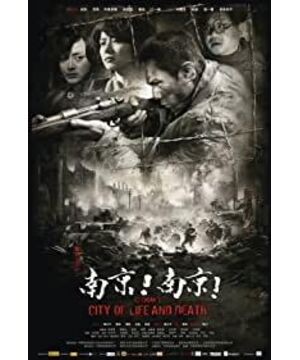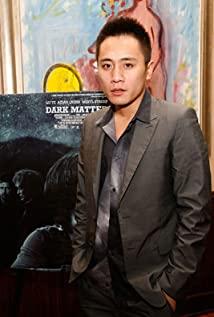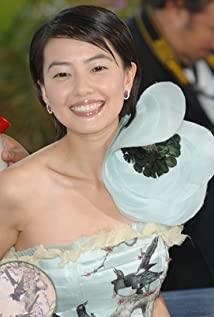But what makes people feel entangled and depressed is that although he is not that bad, he is far from being as good as Lu Chuan said. There are too many blunt places in the film itself, from the script to the directing technique.
The film is called "Nanjing! "Nanjing", it gives the impression that it tells the story of the whole era, and it creates a group portrait, but Lu Chuan finally chose the Japanese soldiers, Gao Yuanyuan, Fan Wei as the foothold, not these characters No, but it will completely give people a disappointment in their psychological expectations. He could have gone by some other name, but either for commercial purposes or for political reasons, he chose this shocking name and made a film that didn't live up to its name.
Before the release, the most praised and the most amazing is the Japanese point of view of the film. Lu Chuan said a lot of righteous words about this, the general idea is that we should reflect, the war has been going on for more than 70 years, and we can't reduce the Japanese to a moustache clown. We need to analyze it calmly and know the nature of the slaughter in war. It was this sentence that moved me, made me rush into the cinema impatiently, and then watched this film, which was almost completely uninnovative.
Lu Chuan always said that let us understand the essence of the slaughter and let us know that the Japanese are also flesh and blood, so he created the image of Kadokawa. But what can Kadokawa reflect? What he reflects is nothing more than the old concept of war. War destroys people, and war destroys people's emotions. War is cruel, and those who invade others will also be questioned in their hearts. But why did Kadokawa join the war? How did he face both his obedience to the emperor's belief in his constitution and the violent acts of brutal killing of innocent people in China? What kind of confrontation will these two different feelings produce in his heart, the film does not show it at all.
In addition, behind Kadokawa, what about the Japanese soldiers who completely regarded the Chinese as inferior races and slaughtered the people of Nanjing? Are they flesh and blood? How did they feel when they faced the war and the killing, and how did they view the killing? Do they just see people as symbols, props of activity? So what kind of force prompted them to form this idea? In the war, are there more people like Kadokawa, or are there more Japanese soldiers who are like killing machines? The character of Kadokawa has never been typical, he is more like a character in a drama.
Lu Chuan photographed the Japanese, and he did not rank the Japanese as ghosts. But the Japanese he shot from a Japanese perspective doesn't seem to have much to do with Nanjing. They may be the Japanese who invaded Nanking or the Japanese who invaded Korea, or even soldiers in a unit that only conducts acting training. Characters should be closely related to environmental events, influencing and changing each other. Obviously, Lu Chuan did not do this.
The setting of Liu Ye's paragraphs at the beginning of the film is somewhat inexplicable. He appeared and took up a lot of perspectives and scenes, but died soon after. In addition to bringing out the later Xiaodouzi, he can almost become a character completely independent of the whole story. And after his death, it is difficult for us to understand what kind of character he was, what kind of internal conflicts he had, and how the war changed him and what influence it brought to him. After starting to describe Liu Ye, there are scenes of Qin Lan and Fan Wei's family who are amazing, and then there is no news. It dragged on for a long time until Liu Ye sacrificed before returning to the screen. The mess is really uncomfortable, it feels like two stories are forcibly put together. Lu Chuan has always claimed that he is calm and objective, but he always gives Liu Ye a close-up. At the beginning, when the Japanese soldiers rushed to the refugee camp, a little girl riding on her parents looked around and found that the people around her raised their hands to surrender, and she raised their hands hesitantly. This shot is too deliberate and too blunt. It's really awkward to want to be quiet and still want to stir up feelings.
Another inexplicable thing is that when the Japanese army just rushed into the refugee camp, the wounded Chinese soldiers raised their guns to express their surrender. What was Lu Chuan's intention in describing this? If you want to describe human nature from a more realistic aspect, Chinese soldiers are not all superhumans who would rather die than surrender, and they will also surrender and give up.
The Chinese people have always been blurred here, basically showing a state of numbness and daze. How can you forget the most important protagonist when you photograph Nanjing and the memory of a city. They are the group that suffers the most damage and pain. Lu Chuan has found new perspectives and new ways of telling stories, but he has taken the most important things out of this war.
The character creation is a bit vague throughout the film. Gao Yuanyuan was portrayed as a saint. Facing the Japanese, she has never been afraid, what supports her to regard the protection of refugees as her mission. She is always a plane, even Ping Ming can only be regarded as a line. The only one that is formed is Kadokawa, but Kadokawa has not been completely formed, at most, more than half of it has come out. Will he also fall in love with other people when he is a beautiful girl in China? Will the pleasure of mastering other people's destiny occasionally make him unable to extricate himself. These are all ignored. Lu Chuan could completely take out one of these stories and talk about it carefully and fully, but he had bigger ambitions, so most people became a blank slate.
The most incredible part is at the end of the film, it just keeps me baffled that Bean and the soldier survive. And when Kadokawa committed suicide, would it be the kind of joyous innocence that they found out that they could really live? He is a calm and numb little warrior who has experienced countless lives and deaths, and his childhood has long been wiped out by constantly witnessing death and parting. Life was so good and so pure for him that he couldn't help but rejoice? What he should have done more is whether he walked over with a blank face, whether more hatred and numbness were burning in his heart. At this time, Lu Chuan couldn't help but use upgrades and music, perhaps because he wanted to sublimate a theme at the end of the film. A sublimation that sets the audience's emotions as nothing.
He is not worthy of the name of this movie (it turns out that the word QIANGJIAN cannot appear, otherwise it will not be posted).
View more about City of Life and Death reviews











